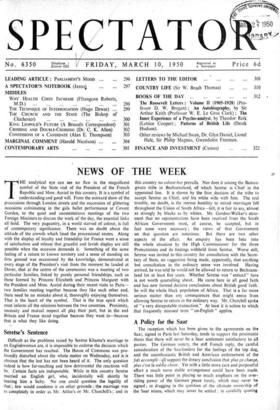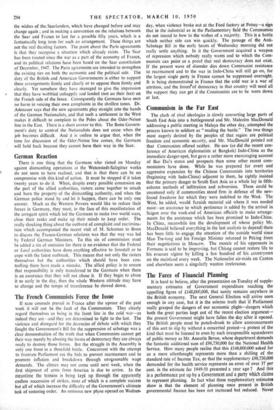A Policy for the Saar
The reception which has been given to the agreements on the Saar, signed in Paris last Saturday, tends to support the pessimistic thesis that there will never be a Saar settlement satisfactory to all parties. The German outcry, the stiff French reply, the careful consideration of the Saarlanders for the feelings of the top dog, and the unenthusiastic British and American endorsement of the fait accompli—all support the dreary conclusion that plus ca change, plus c'est la meme chose. Yet with a little more care and purposeful effort a much more stable arrangement could have been made. There was little point in placing so much emphasis on the over- riding power of the German peace treaty, which may never be signed ; in dragging in the question of the ultimate ownership of the Saar mines, which may never be settled ; in carefully quoting the wishes of the. Saarlanders, which have changed before and may change again ; and in making a convention on the relations between the Saar and France to last for a possible fifty years, which is a fantastically long term for such an arrangement. These things are not the real deciding factors. The point about the Paris agreements is that they recognise a situation which already exists. The Saar has been treated since the war as a part of the 'economy of France, and its political relations have been based on the Saar constitution of December, 1947. The Paris agreements are intended to strengthen the existing ties on both the economic and the political side. The duty of the British and American Governments is either to support these arrangements firmly and clearly or to oppose them firmly and clearly. Yet somehow they have managed to give the impression • that they have wobbled unhappily and landed (not on their feet) on the French side of the fence. Consequently the Germans have seen no harm in voicing their own complaints in the shrillest tones. Dr. Adenauer says that the new agreements play straight into the hands of the German Nationalists, and that such a settlement in the West makes it difficult to complain to the Poles about the Oder-Neisse line in the East. There is a short answer to this. The Bonn Govern- ment's duty to control the Nationalists does not cease when the job becomes difficult. And it is useless to argue that, when the time for discussion of the Oder-Neisse line comes, the Germans will hold back because they cannot have their way in the Saar.



































 Previous page
Previous page